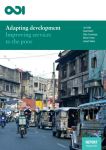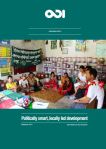Authors: Leni Wild, David Booth, Clare Cummings, Marta Foresti, Joesph Wales
Published: 2015
Organisation: ODI
See multimedia resources and report PDF
On current trends, it will take decades – if not longer – to bring basic services of adequate quality to the world’s most disadvantaged people. Meeting this challenge demands a radical departure from the MDG approach: extra funding will not be enough, and broad calls for ‘good governance’ or ‘inclusive institutions’ will miss the point.
This report argues that if we are to avoid reproducing the pattern of uneven progress that has characterised the MDG campaign, there must be more explicit recognition of the political conditions that enable or obstruct development progress. In this context, domestic reformers and their international partners must pursue innovative and politically smart ways to tackle the most intractable problems. The report is, therefore, aimed at governments, domestic reformers and at the external actors (donor agencies, NGOs and others) that can support them to do development differently.



